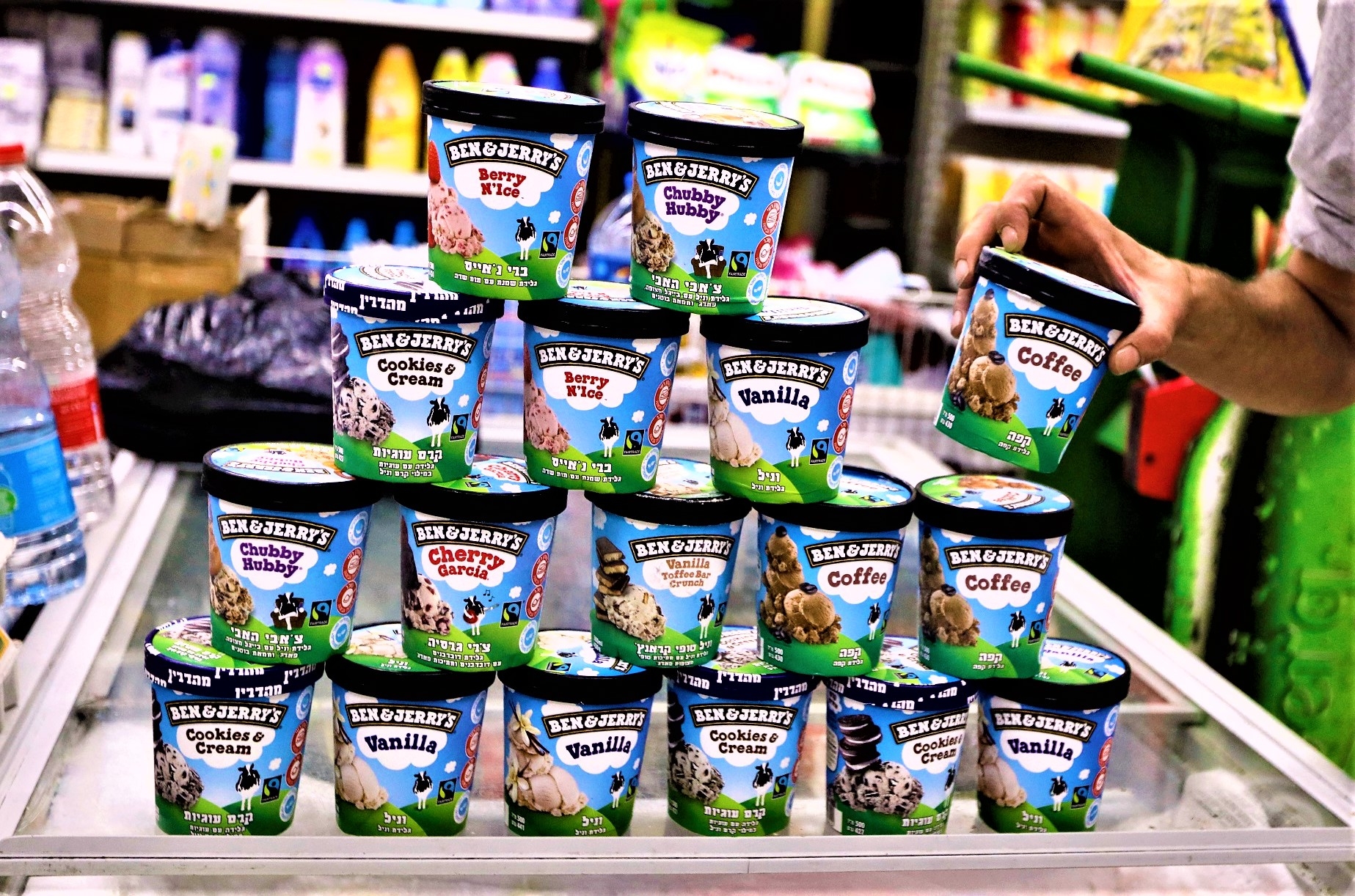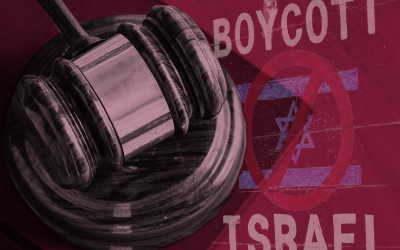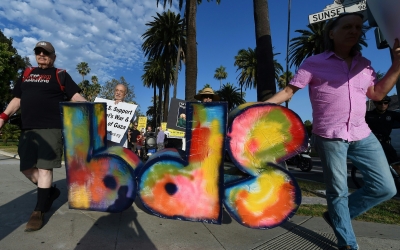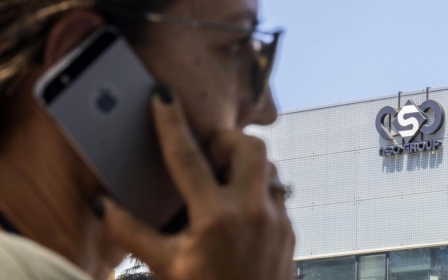Ben & Jerry's: Israeli leaders treat Palestinian territories as Israel

Israeli leaders are having a meltdown at Ben & Jerry's decision to freeze sales in the Occupied Palestinian Territories, claiming that it constitutes a boycott of Israel - effectively asserting that Israel spans from the Jordan River to the Mediterranean Sea.
Foreign Minister Yair Lapid called it a "shameful surrender to antisemitism". Prime Minister Naftali Bennett bemoaned the decision as "morally wrong" and his predecessor Benjamin Netanyahu implicitly called for a boycott of the ice cream brand.
"Now we Israelis know which ice cream NOT to buy," he wrote on Twitter.
'Our goal is to celebrate this win while asking Ben and Jerry's to take the next step and withdraw completely from Israel'
- Ahmad Abuznaid, USCPR
The Israeli outrage, however, did not acknowledge that Ben & Jerry's explicitly stated that it was not boycotting Israel but only ceasing sales in Palestinian territories occupied illegally under international law.
The American pro-Israel lobby AIPAC described the ice cream company's move as "discriminatory".
New MEE newsletter: Jerusalem Dispatch
Sign up to get the latest insights and analysis on Israel-Palestine, alongside Turkey Unpacked and other MEE newsletters
The Anti-Defamation League (ADL), an advocacy group that is staunchly pro-Israel, expressed disappointment at the decision, which it said feeds "into dangerous campaigns that seek to undermine Israel".
The same ADL declared last year that calls for a single state with equal rights for all inhabitants in Israel and the Palestinian territories "are themselves antisemitic".
'No distinction'
Palestinian rights advocates were quick to point out that these statements rebuking Ben & Jerry's demonstrate that Israel and its supporters acknowledge there is no distinction between illegal settlements in the West Bank and internationally recognised Israeli territories.
"There is no distinction between the territories and Israel proper," Jinan Deena, national organiser for the Arab American Anti-Discrimination Committee (ADC), told MEE.
'American companies with radical ideological agendas cannot be allowed to go against the policy of the United States'
- Gilad Erdan, Israel's envoy to US
"Israel continues to control all borders and air space, even in areas under the control of the Palestinian Authority.
"The fact that some Israeli leaders are outraged is comical - they have held the freedom of the Palestinians at bay as they continue to impose their apartheid regime."
Human rights groups and Palestinian rights activists have been stressing that the government of Israel rules over all inhabitants of historic Palestine - Israeli citizens and occupied Palestinians, with the latter group enjoying no political or civil rights.
Because of that dual system of governance along with discriminatory policies against Palestinian citizens of Israel, leading rights organisations, including Human Rights Watch and B'Tselem, have accused Israel of practising apartheid against Palestinians.
'Celebrate this win'
Israel's supporters fend off the charge by arguing that the occupation of the West Bank and East Jerusalem, which were captured by Israel in 1967, is not permanent, but a fluid issue that must be resolved in negotiations.
The reaction to Ben & Jerry's pulling out of the Occupied Territories, however, brought the unspoken Israeli position to the surface: Israeli leaders view the West Bank as part of Israel.
On Monday, Bennett complained about Ben & Jerry's decision to Unilever, the London-based multinational corporation that acquired the ice cream company in 2000. The Israeli prime minister warned of "severe consequences".
"Prime Minister Bennett spoke with Alan Jope, CEO of Unilever which owns Ben & Jerry's and made it clear that he views with utmost gravity the decision by Ben & Jerry's to boycott Israel and added that this is a subsidiary of Unilever, which has taken a clearly anti-Israel step," his office said in a tweet.
Despite the merger with Unilever, Ben & Jerry's retained control over its social mission.
"There actually is no distinction between the State of Israel and its occupation and its settlements and its apartheid," said Ahmad Abuznaid, the executive director of the US Campaign for Palestinian Rights (USCPR).
"And so our goal is to celebrate this win while asking Ben and Jerry's to take the next step and withdraw completely from Israel."
BDS is growing
Palestinian rights activists celebrated the ice cream company's decision on Monday, which was announced with a statement stressing that operating in the Occupied Territories is "inconsistent" with Ben & Jerry's "values".
The Vermont-based company has been supportive of many social justice causes, including the Black Lives Matter movement, voting rights and LGBTQ issues.
Abuznaid said Ben & Jerry's move is meaningful because of the size of the popular ice cream manufacturer as well as the place that it occupies politically as a socially conscious business.
"This is very significant, not only because of its positioning as one of the biggest ice cream brands but because of how it has attached itself to progressive and social justice causes," Abuznaid told MEE.
"And so, as we've been consistent that all progressive circles in the United States must include Palestine as a call for justice, seeing this decision by Ben and Jerry's shows that we are growing as a movement."
But as the Palestinian-led Boycott, Divestment and Sanctions (BDS) movement hailed Ben & Jerry's statement, Israeli officials started a push to subvert it coercively.
It began with Lapid on Monday, who invoked US states' anti-BDS laws that penalise companies that boycott Israel.
"Over 30 states in the United States have passed anti-BDS legislation in recent years," Lapid wrote on Twitter. "I plan on asking each of them to enforce these laws against Ben & Jerry's. They will not treat the State of Israel like this without a response."
Anti-BDS push
Leading free speech advocates, including the American Civil Liberties Union, have denounced such measures for infringing on Americans' free speech rights.
Federal courts have struck down anti-BDS laws in Georgia, Kansas, Arizona, Texas and Arkansas for violating the First Amendment of the US Constitution.
These laws, passed in dozens of states, share a similar language. They ban states from entering with contracts or dispersing public funds to companies that boycott Israel and Israeli-controlled territories.
In the latest ruling earlier this year, a district US court judge found that Georgia's anti-boycott law "places an unconstitutional incidental burden on speech".
Still, Gilad Erdan, Israel's ambassador to the US, doubled down on Tuesday on the forceful approach to punish Ben & Jerry's in the United States.
"American companies with radical ideological agendas cannot be allowed to go against the policy of the United States and act against normalization and peace," Erdan wrote in a letter to US governors that he posted on Twitter.
He cited the case of Airbnb, which reversed a decision to remove settlement listings in 2019 after pressure from US states enforcing anti-BDS laws.
Deena, the ADC organiser, noted the irony that Americans are free to boycott US businesses, but dozens of states have a boycott exception for Israel.
"It is interesting to me that we can boycott any American company - one that employs and sustains our own people and economy - yet we cannot boycott companies that directly fund and support a foreign country, a country that repeatedly has violated international and human rights laws," she told MEE.
Middle East Eye delivers independent and unrivalled coverage and analysis of the Middle East, North Africa and beyond. To learn more about republishing this content and the associated fees, please fill out this form. More about MEE can be found here.






